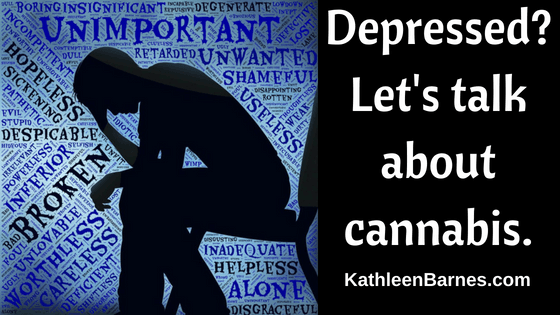By Ralf Llanasas
Cannabis Express, Australia
Note from Kathleen: We’re hearing more and more about the beneficial effects of marijuana in treating a wide variety of health concerns. In the interest of presenting a balanced view of the pros and cons of marijuana use to address depression. I’m publishing this piece by Ralf Llanasas of Cannabis Express, Australia (cannabisexpress.com.au) about the effects of cannabis on depression. As many of you are aware, I never recommend the use of prescription anti-depressants, which are at best ineffective and at worst can lead to serous health problems. Instead, look at natural ways to address depression, including rhodiola rosea, SAM-e, vitamin D, fish oil and 5-HTP as well as exercise, cognitive behavioral therapy and tapping. All are well-researched and effective with few or no side effects.
Now is the time to ask whether we should be using Cannabis to fight depression
The question of whether and how cannabis should be used to treat depression would be an important one at any time, given the number of people who suffer with the mental disorder.
Given the increasing acceptance of cannabis in society and the drug’s growing availability, arguably, there has never been a better time to consider the research.
Canada has legalized recreational cannabis use, as has Uruguay. In the U.S., 29 states have legalized medical and or recreational marijuana. It seems the world is coming to a tipping point as concerns its feelings around cannabis and is prepared to accept the drug in to mainstream use. It appears only a matter of time before cannabis legalization ripples around the world. An understanding, then, of how cannabis use impacts those dealing with a mental health issue is important to establish.
Obviously, nothing on this page should be taken to be medical advice.
The case against using cannabis to fight depression
Those who express concern about the use of marijuana in the battle on mental health point out that, as things stand, it is extremely hard to measure the THC composition (‘strength’) of what is provided to a patient which makes it something of a hit and miss treatment for any ailment, including depression. Cannabis bought illegally suffers many of the concerns that other illicit drugs must face. It is hard to measure purity or dosage. Street drugs are also often bread to be as strong as possible. Street cannabis is almost always smoked, sometimes with tobacco which obviously draws in to question the medical advisability.
A proportion of users of any drug become addicted. In the case of cannabis, around 9% of users become addicted. The costs of addiction must be weighed against the benefits of any treatment.
Those suffering from mental illnesses including bipolar or schizophrenia should be especially careful. The literature available on the subject is universally clear on this issue. High THC cannabis could well accentuate the manic aspects of those conditions and should be avoided by patients experiencing those issues.
The matter is further complicated because short and long term effects of use may vary according to the specifics of the circumstance. There are a number of what statisticians call ‘confounding variables’ (those which can muddy the waters beyond usefulness) such as the patients upbringing and current personal / work environment.
The case for using cannabis to fight depression
Some therapists do recommend the use of cannabis to treat anxiety and depression.
There are anecdotal reports from a significant number of army veterans who enthusiastically endorse the use of cannabis in their fights against PTSD.
Similarly, many (although not all) people suffering from chronic pain suggest taking marijuana eases their pain. In situations where the patient has depression alongside chronic pain, for example, cannabis might have a primary effect on mood and secondary effect as part of alleviating pain for the sufferer.
Others say cannabis helps them relax and reduces anxiety. In all, there is a growing list of medical research becoming available, partly as a result of the loosening of rules concerning how easy it is to get the drug to conduct these tests. There is little doubt that marijuana has a number of psychological and physical benefits.
Where does the sum of the literature on the question come out?
Psychological literature has studied the question of cannabis use by depressed patients in some detail and, on balance, at this stage, appears ready only to suggest that there is an association between the use of cannabis and increased levels of anxiety and depression.
Use of cannabis in early life, the teen years when the brain is still forming, for example, can be particularly damaging. Regrettably, the effects seem particularly pronounced for girls.
On balance, tread carefully with weed and depression
At this stage, given the balance of information available on the costs and benefits of cannabis as a treatment for medically diagnosed depression is mixed.
Antidepressants are a more reliable treatment with a higher likelihood of success than cannabis, unless your therapist specifically suggests otherwise.








